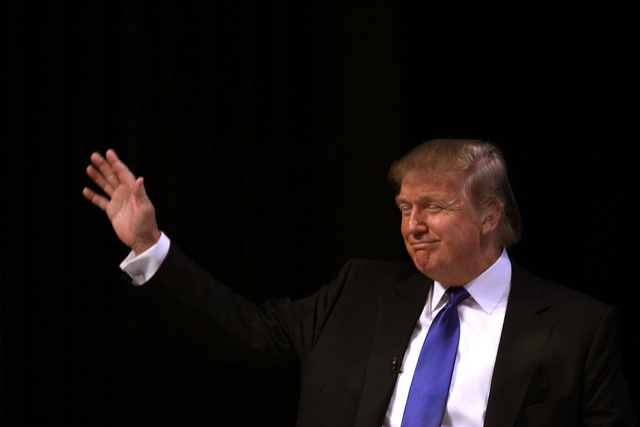
Donald Trump’s loutish campaign for the US presidency has left most of the world – excluding, perhaps, Russian President Vladimir Putin and his European populist allies, like France’s Marine Le Pen—confused and aghast. Indeed, it is difficult for anyone to assess not only what Trump would do as President, but also which racial or religious minority, or foreign country, he holds in greatest contempt.
Name virtually any group or country, and you can bet Trump has insulted it. He has called Mexican immigrants to the US ‘criminals’ and ‘rapists.’ He has proposed banning all Muslims from entering the US. He has flung sexist invective at professional women, such as the political pundit Megyn Kelly, who have the temerity to stand up to him, and has called others ‘dogs’ and ‘fat slobs.’ He has sneered at America’s European and Asian allies, and blamed China for many of America’s economic woes.
But it seems that the people whom Trump holds in the greatest contempt are his own supporters. Instead of giving anything like a straight answer about the policies he would pursue were he actually elected, he has stoked and manipulated their inchoate rage, rooted in frustration with stagnant wages and fear of the unknown.
Japan has particular reason to be unsettled by ‘The Donald’s’ incendiary rhetoric, which has the potential to do lasting damage. At one moment, he treats Japan as a freeloader, unnerving Japan’s citizens about the state of our core security alliance with the US. At the next, he says that he would not think twice about Japan (and South Korea) becoming a nuclear-weapon state, feeding fears that today’s arms race in Asia might escalate beyond conventional weapons. Then he backpedals, claiming the words were fabricated by the media.
Under ordinary circumstances, the world could dismiss the ignorant rabble-rousing of a populist like Trump, whose campaign would remain a fringe affair. Yet Trump has so far captured the largest share of Republican Party primary voters. And, at this late date in the campaign, it seems highly improbable that the party will find its way back to sanity and produce a reasonable candidate for the election in November. In other words, Japan and the rest of the world ignore Trump at their own peril.
Republicans—indeed, all Americans—must understand the risks to global stability, and even peace, that could accompany a presidential campaign that becomes a Trump-produced spectacle of incendiary demagogy. And that could happen. Trump’s campaign is now managed by one of the most cynical—and most effective—operatives in the business: Paul Manafort, whose repackaging efforts in 2010 duped Ukrainians into thinking that Viktor Yanukovych, whom they eventually overthrew in a bloody revolution, was a democrat.
The impact in Japan, and across Asia, of Trump’s vision of a nuclear-armed Japan is a striking example of how his muddled jingoism can unsettle political discourse. Prime Minister Shinzo Abe has lately been undertaking modest reforms to Japan’s defence posture, aimed at ensuring that in the event of some regional crisis, Japan’s Self-Defense Forces could come to the aid of our allies—in particular, the US. Some Japanese, however, view the reforms with concern, fearing that the peaceful Japan of the last seven decades will suddenly revert to the militaristic Japan of the 1930s.
Trump’s inflammatory rhetoric has helped to take these fears to the next level, with some opponents of Abe’s defence reforms detecting, they believe, the germ of some secret conspiracy with the US to turn Japan into a nuclear-weapon state. Of course, such fear mongering will attract only the most gullible. But given the need to reassure the Japanese public that Abe’s reforms are truly what he says they are—that is, modest changes that will allow Japan to deepen its alliance ties—Trump’s intervention is the height of irresponsibility.
Beyond undermining core political alliances, Trump seems prepared to undo much of the progress that has been made in deepening America’s economic relationships, not only with Japan, but also with the rest of the world. Abe has taken enormous political risks at home in embracing the Trans-Pacific Partnership, aimed at building a rules-based order for trade and investment among a dozen countries on both sides of the Pacific. Other leaders, including US President Barack Obama, have done the same. Yet Trump seems willing to oppose that stance, in order to stoke voters’ anger and maintain their support.
Of course, the real question is how deeply held Trump’s ideas are among ordinary Americans. Is it possible that a substantial bloc of Americans today really wants to pull up the drawbridges and embrace isolationism?
For Japan and other US allies, an isolationist America remains a distant prospect. But as we watch the United Kingdom prepare for its referendum on European Union membership, doubts begin to creep in. In Britain, a small-minded sector of the Conservative Party has played on almost the same sentiments as Trump to stoke political rage and turn ‘Brexit’ into a real possibility. And, just as Trump has done to the Republicans, they have torn apart their own party—the party of Winston Churchill and Margaret Thatcher—in the process. With this in mind, it may be time to admit that America really could return to isolationism.
America’s friends and allies around the world need to declare clearly, as Obama has done to the British people, that isolationist policy characterised by contempt for others will only make peace and prosperity harder to achieve. In the US, Republicans like Senators John McCain and Lindsey Graham, who care deeply about America’s standing in the world, will have to put aside party loyalty in favour of love of country and refuse to back Trump (and perhaps the equally incendiary Ted Cruz) in a presidential race. If a Trump presidency does emerge, it will be a loss for the Republican Party, the US as a whole, and its allies.

